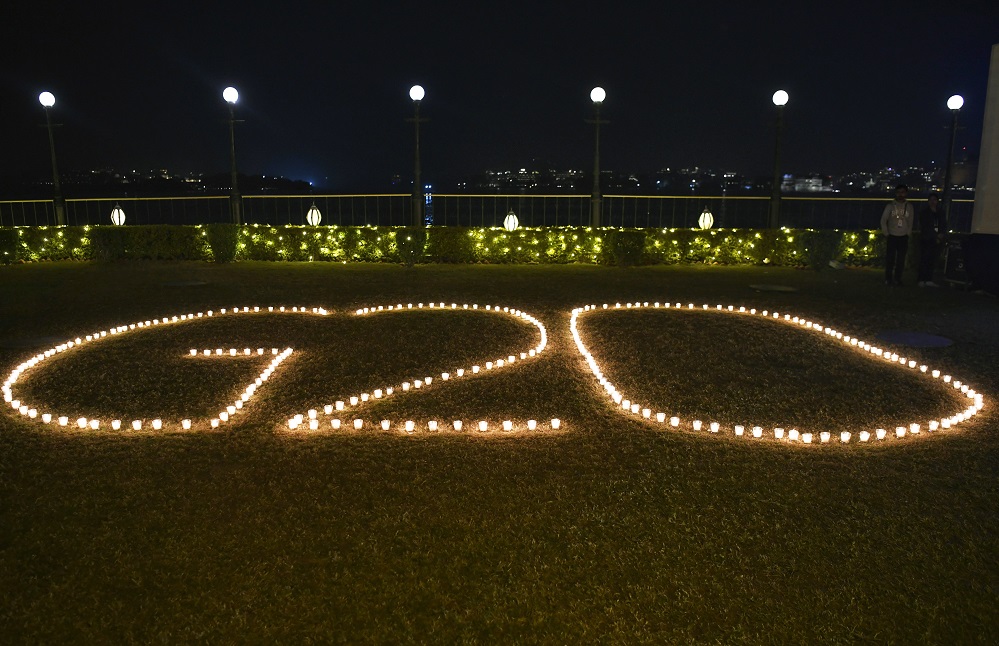As the host nation of G20, India will be in an awkward position as the Russian President is expected to attend the summit.
In 2023, India is at the epicentre of diplomacy with it hosting two key multilateral forums, the SCO (Shanghai Cooperation Organisation) and G20. Add to that Prime Minister Narendra Modi’s upcoming visits to Japan for the G7 summit, to Australia for the Quad summit, to the United States on a state visit, and for BRICS summit to South Africa. If that was not enough, recently French President Emmanuel Macron invited PM Modi as a guest at the French National Day in July. Despite all these visits, multilateral engagements and high octane “diplomacy tourism”, will India be able to derive advantage on the foreign policy front for its core issues—so relevant for its domestic audience? We outline five key areas upon which India needs to ensure a positive response from the international community.
Firstly, India’s balancing act between Russia and the West on the Ukraine conflict might come under revision. It has so far balanced its foreign policy with strategic autonomy to keep both sides content ever since the Ukraine conflict started. On the one hand, India’s response that “now is not the time for war”, calls out for a diplomatic solution; although not outrightly condemning its all-weather friend Russia for violating the territorial integrity of a sovereign nation. A case in point is India’s several abstentions on UN resolutions against Russia. As S. Jaishankar famously remarked on the Ukraine conflict that “India is not sitting on the fence, we are sitting on our own ground”, hence justifying India’s self-serving position on the conflict. India got discounted oil and gas from Russia, thereby tackling inflation and bringing stability to its economy in turbulent times. For the moment, India is clinically managing this tightrope between Western nations and Russia. But sooner or later, India will have to lean towards one side of the fence as the scope of bargains from both fronts might diminish—should the war prolong.
As the host nation of G20, India will be in an awkward position as the Russian President is expected to attend the summit. While Ukrainian President Zelenskyy requested an invite to the G20 high table—something India might go silent on. In the coming months, as India refines its G20 agenda in the run-up to the leaders’ summit in September, it will increasingly face headwinds from its western partners to use the fora to condemn Russia. This is something India wants to avoid as the Ukraine conflict can hijack the G20 summit as it did during the G20 Foreign Ministers’ meeting. Hence, India’s aspiration to deliver something concrete and consequential from this year’s presidency is very much under question.
Secondly, bringing the international community to support India’s stance against China and Pakistan should be a priority. Multilateral forums like the G20 and SCO do not accommodate bilateral issues. Notwithstanding that, India should use these platforms to raise concerns related to border violations and terrorism. Beyond the hundreds of visits during the G20 Summit of over two dozen diplomats, ministers and their appointed Sherpa, India needs to be cautious that these multilateral forums do not become a mere tourism spectacle for visiting dignitaries. India deciding to host some of its G20 events in Arunachal Pradesh and Jammu & Kashmir is a step in the right direction.
The third agenda could be promoting its candidacy for the United Nations Permanent Security Council (UNSC) seat. India must use its Presidency to drum up support among member nations and with a wider outreach to other countries, particularly in Africa and South America. It needs to strengthen its position further with other UNSC seeking countries such as Brazil, Germany Japan—often called the “G4 nations”—to reinvent UN’s governance mechanism and expand the five-member permanent security council to reflect the geopolitical realities of the 21st century. This is going to be tough, but India must spearhead this mission to put pressure on the UN and the international community to support its candidature.
Fourthly, accelerating its trade negotiation with major economies and regional blocs. Capitalizing on these upcoming forums, India must explore ways to ensure greater access to its exports of merchandise and services to foreign markets, seeking reduction in tariff and non-tariff barriers. This will inevitably help India to diversify its trade basket and reduce trade imbalance with some of its major trade partners. India could also explore a trade agreement with the 54-member African comprehensive free trade agreement (AfCFTA) and the South American trading bloc (MERCOSUR). It should further expedite its ongoing trade negotiations with the EU, UK, Canada, GCC (Gulf Cooperation Council) while also seeking greater economic and investment opportunities for its economy.
And finally, India’s quest to get a better deal for the Global South countries at G20 and become its key and meaningful voice could earn her legitimacy as a rising powerhouse. However, the Ukraine conflict can overshadow the G20 summit and could hurt any substantial progress in policymaking relevant for the low-income countries on climate change, trade facilitation, healthcare resilience support, debt refinancing etc.
In this hectic diplomatic calendar, India needs to leverage its G20 presidency and its role in other forthcoming multilateral forums to its advantage. The coming months will be a testing time for India’s foreign policy to see as to how much it delivers for the international community on critical agendas. While simultaneously what it derives for its national agenda and domestic audience. As India aspires to become a “vishwa guru” and promote the ethos of “the world is one family”, it must not dither from its core foreign policy issues addressing its very strategic and economic interests.
Dr Mohit Anand is Prof of International Business and Strategy at EMLYON Business School, France. Rajesh Mehta is a leading consultant and columnist working on market entry, innovation and public policy.

